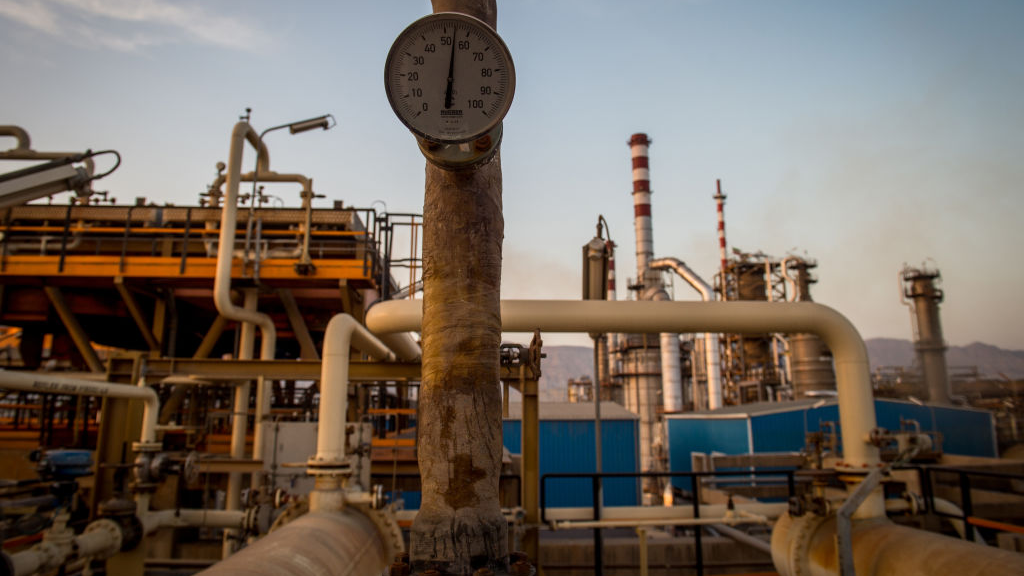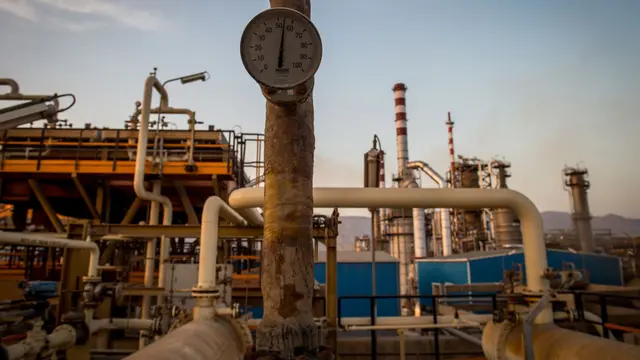
A valve pressure gauge sits on a pipe at the Persian Gulf Star Co. (PGSPC) gas condensate refinery in Bandar Abbas, Iran, January 9, 2019. /Getty
Editor's note: Andrew Korybko is a Moscow-based American political analyst. The article reflects the author's views and not necessarily those of CGTN.
The two seemingly unconnected issues of another Iranian nuclear deal and the Russian Nord Stream 2 gas pipeline to Germany could prospectively be paired together as part of a larger compromise solution between the East and West.
The U.S.' concerns about Western Europe's alleged dependence on Russian resources could be placated in the event that a diplomatic breakthrough with Iran is reached whereby Washington's unilateral sanctions are removed and the Islamic Republic is able to export more energy to Europe without restrictions. To understand the benefits of this visionary proposal, some background context is necessary.
America's antagonism to Nord Stream 2 stems from the prediction that enhanced energy relations between Russia and de facto European Union (EU) leader Germany would lessen U.S. influence over the bloc. The thinking goes that Moscow and Berlin might eventually jointly manage continental relations in a way that reduces the U.S.' traditional sway.
In response to these fears, the U.S. has imposed sanctions against the project together with improving its costly LNG export capabilities to the EU. Regarding the latter, it intends to use Croatia, Greece, Lithuania, and Poland as its energy gateways to Europe through the construction of new LNG terminals there.
In parallel with this, the U.S. is considering the possibility of removing its anti-Iranian sanctions in exchange for Tehran making concessions on its nuclear energy capabilities, ballistic missile technology, and regional influence. The problem is that neither side trusts the other enough to make the first move, believing that their counterpart might go back on their word under a manufactured pretext and therefore play the other as a fool. This has led to an impasse which might ultimately spoil the possibility of a diplomatic breakthrough. That being the case, progress might be achieved if the U.S. realizes that it can connect the Iranian and Nord Stream 2 files.
If political calculations are removed from the equation, there's no reason why European countries wouldn't want to receive cheaper and more reliable energy imports from Russia. It doesn't economically make sense to pay more for expensive LNG from halfway across the world. Nevertheless, despite having weaker economies than their Western counterparts, the governments of some Central and Eastern European countries like Poland would prefer to pay more for American energy due to their historical mistrust of closer Russian-German relations.

A crane moves Nord Stream 2 pipes at the Mukran port near Sassnitz, Germany, June 5, 2019. /Getty
The economic costs of these calculations are already controversial as they are, but made all the more contentious of an issue in light of the global economic crisis caused by the COVID-19 pandemic. It'll be difficult for the Central and Eastern European economies to recover if the base cost of their energy imports is higher than their Western peers because of their governments' decision to import more expensive resources from the U.S. instead of from Russia for political reasons. They'd therefore likely be interested in purchasing Iranian energy instead of in the event that Washington reaches a deal with Tehran.
About that, the U.S. is extremely hesitant at the moment to do anything that would bring much-needed revenue to the Iranian government until it undertakes concessions on the earlier examined issues. The American thinking is such that its strategists believe that the lessening and removal of sanctions should be a so-called "reward", no matter how arrogant this idea is since Iran has the international right to sell its resources without fear of repercussions. Be that as it may, Iran also has an inherent interest in seeing the sanctions removed so that its energy-related revenue flows can resume as soon as possible.
With this in mind, a compromise might be possible. The U.S. could stop its resistance to Nord Stream 2 if it eventually lessened its anti-Iranian sanctions so as to unlock the Islamic Republic's vast energy export capacity to Europe as a means of reducing the continent's perceived over-reliance on Russian resources.
U.S. LNG exports could still continue to be purchased by those countries that have an interest in paying higher costs for political reasons such as retaining their excellent relations with the United States. Everyone would win in this case and balance would be ensured between all interested stakeholders, but only if the political will is present to do this.
(If you want to contribute and have specific expertise, please contact us at [email protected].)
 简体中文
简体中文

